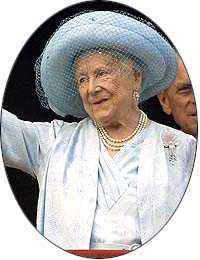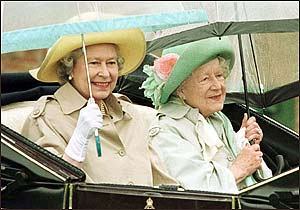
101 YEARS OF LOYAL SERVICE
Grandma to us all

|
QUEEN Elizabeth the Queen Mother strode the 20th century with a neat precision. She became one of its best-loved figures not only by virtue of her great and active longevity, but by the part she played in the shaping of her times. Lady Elizabeth Angela Marguerite Bowes-Lyon was born on August 4, 1900, in the middle distance of history. Queen Victoria was in the last year of her life and the Wright brothers had not yet made the first heavier-than-air flight. But she lived to see men land on the Moon, photograph Jupiter and circumnavigate the globe in a tricycle with wings. In that span she witnessed the First and Second World Wars, the beginning and end of the communist empire and the complete dissolution of British imperial power. She was born to the telegram and lived to see the Internet.  Queen Elizabeth brought fresh blood to the tired Hanoverian genes of the British Throne. Her defining moment occurred when fate cast her in the role of Queen Consort to the immensely shy and uncertain monarch of a nation at war and in grave danger of defeat. She married Albert, Duke of York, on April 26, 1923, 13 years before he became King George VI. Queen Elizabeth brought fresh blood to the tired Hanoverian genes of the British Throne. Her defining moment occurred when fate cast her in the role of Queen Consort to the immensely shy and uncertain monarch of a nation at war and in grave danger of defeat. She married Albert, Duke of York, on April 26, 1923, 13 years before he became King George VI.From the very beginning she was assured an honoured retirement and a place of particular affection in the nation's collective consciousness. Her essential talent was to be the grandest lady in the land without ever appearing so; her greatest contribution to the British Throne, and to the world at large, was her personality. On the occasion of her 80th birthday, this newspaper noted: "Making royalty human is what she achieved. Who else could plant the third or fourth thousandth tree of a lifetime of planting trees, and still leave on the Lady Mayoress the impression of really being pleased to meet her? What is more, of whom else would that impression be true?"  She was a consummate and natural actress; her innate understanding of her public outplayed that of any Hollywood queen. She was quietly ambitious for high position, and having achieved it undoubtedly relished its trappings of obeisance and attention. She was a consummate and natural actress; her innate understanding of her public outplayed that of any Hollywood queen. She was quietly ambitious for high position, and having achieved it undoubtedly relished its trappings of obeisance and attention.She breathed with ease and success the rarefied air of royalty, but she never lost her common touch or her genuine enjoyment of people, the handsome dividend of a childhood among a large, close family. Queen Elizabeth was our last eminent Victorian, upholding the virtues and values of that age throughout her life: a belief in God, duty, the sanctity of marriage, hard work and a passion for not wasting a moment of life. But as the century progressed those very values seemed ever more at odds with a world of shifting perceptions. From the moment her elder daughter succeeded in 1952, the Queen Mother remained a powerful influence on Royal Family affairs, a queen behind the throne.  Historians may argue that, without her potent voice in family councils, the monarchy might well have been more willing to adapt to the late 20th century, rather than always having to be pushed. Historians may argue that, without her potent voice in family councils, the monarchy might well have been more willing to adapt to the late 20th century, rather than always having to be pushed.It is inevitable that she should have been seen as the last surviving link with stable and immutable monarchy - her own contribution to its stability in the days of George VI was immense - but the era of Victoria is a century gone, and the world is a different place. Yet even as an anachronism, a figure of the past rather than the future, she had great value, seeming at times to be the only firm rock in a sea of troubles that engulfed the Royal Family in the 1990s. The balance of history will be on her side. Her daughter commands admiration and respect for a dutiful, if increasingly trying, reign.  What the Queen Mother commanded, above all, was affection; for all her high principles, she brought the monarchy to the people, and made them believe that it had worth. She always seemed real. What the Queen Mother commanded, above all, was affection; for all her high principles, she brought the monarchy to the people, and made them believe that it had worth. She always seemed real. Behind her unfailing smile she held strong, sometimes reactionary, views, and her political perspective on the world was ultra-conservative. The Duke and Duchess of Windsor and the late Diana, Princess of Wales, viewed her with a reserve bordering on antipathy. But the Prince of Wales, her favourite grandchild, fell from an early age under the spell of her charm, wit and steeliness of character. She was his closest confidante, a huge influence on his life, and a deep well of common sense. She will be remembered not for what she said, for her public utterances were few and she almost never gave an interview. She will be rememebered for what she was and what she did, as a pillar of the war effort and in her countless thousands of small acts, always faultlessly performed. As people might marvel at a great actress, they will marvel at how she did it.
Final Fareway Abbey Service A life in pictures The Queen of a Century British Royal Family The Queen Mother: Memorial Website |